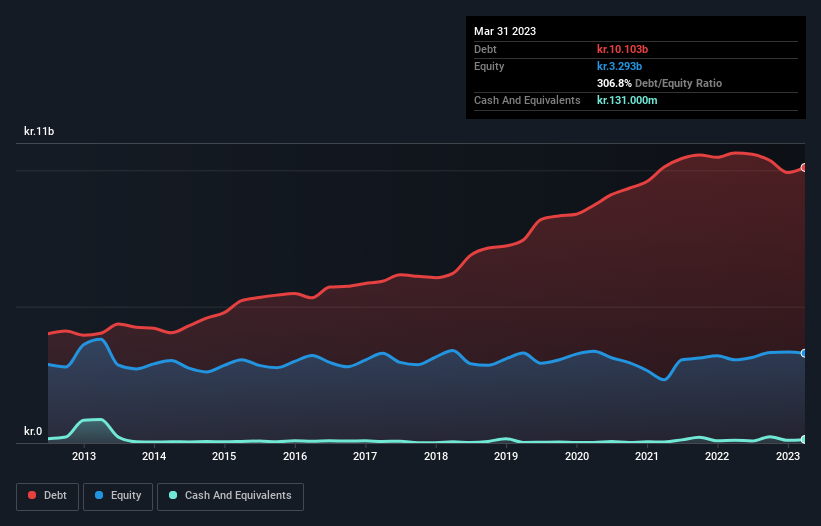- Denmark
- /
- Infrastructure
- /
- CPSE:KBHL
These 4 Measures Indicate That Københavns Lufthavne (CPH:KBHL) Is Using Debt Reasonably Well

The external fund manager backed by Berkshire Hathaway's Charlie Munger, Li Lu, makes no bones about it when he says 'The biggest investment risk is not the volatility of prices, but whether you will suffer a permanent loss of capital.' So it seems the smart money knows that debt - which is usually involved in bankruptcies - is a very important factor, when you assess how risky a company is. Importantly, Københavns Lufthavne A/S (CPH:KBHL) does carry debt. But the real question is whether this debt is making the company risky.
What Risk Does Debt Bring?
Debt and other liabilities become risky for a business when it cannot easily fulfill those obligations, either with free cash flow or by raising capital at an attractive price. In the worst case scenario, a company can go bankrupt if it cannot pay its creditors. However, a more common (but still painful) scenario is that it has to raise new equity capital at a low price, thus permanently diluting shareholders. Having said that, the most common situation is where a company manages its debt reasonably well - and to its own advantage. When we think about a company's use of debt, we first look at cash and debt together.
Check out our latest analysis for Københavns Lufthavne
What Is Københavns Lufthavne's Net Debt?
As you can see below, Københavns Lufthavne had kr.10.1b of debt at March 2023, down from kr.10.6b a year prior. And it doesn't have much cash, so its net debt is about the same.

How Strong Is Københavns Lufthavne's Balance Sheet?
We can see from the most recent balance sheet that Københavns Lufthavne had liabilities of kr.6.96b falling due within a year, and liabilities of kr.5.10b due beyond that. Offsetting this, it had kr.131.0m in cash and kr.406.0m in receivables that were due within 12 months. So its liabilities total kr.11.5b more than the combination of its cash and short-term receivables.
This deficit isn't so bad because Københavns Lufthavne is worth kr.47.7b, and thus could probably raise enough capital to shore up its balance sheet, if the need arose. But we definitely want to keep our eyes open to indications that its debt is bringing too much risk.
We use two main ratios to inform us about debt levels relative to earnings. The first is net debt divided by earnings before interest, tax, depreciation, and amortization (EBITDA), while the second is how many times its earnings before interest and tax (EBIT) covers its interest expense (or its interest cover, for short). The advantage of this approach is that we take into account both the absolute quantum of debt (with net debt to EBITDA) and the actual interest expenses associated with that debt (with its interest cover ratio).
With a net debt to EBITDA ratio of 6.8, it's fair to say Københavns Lufthavne does have a significant amount of debt. However, its interest coverage of 3.3 is reasonably strong, which is a good sign. One redeeming factor for Københavns Lufthavne is that it turned last year's EBIT loss into a gain of kr.542m, over the last twelve months. When analysing debt levels, the balance sheet is the obvious place to start. But it is Københavns Lufthavne's earnings that will influence how the balance sheet holds up in the future. So if you're keen to discover more about its earnings, it might be worth checking out this graph of its long term earnings trend.
Finally, a company can only pay off debt with cold hard cash, not accounting profits. So it is important to check how much of its earnings before interest and tax (EBIT) converts to actual free cash flow. Over the last year, Københavns Lufthavne actually produced more free cash flow than EBIT. There's nothing better than incoming cash when it comes to staying in your lenders' good graces.
Our View
Based on what we've seen Københavns Lufthavne is not finding it easy, given its net debt to EBITDA, but the other factors we considered give us cause to be optimistic. In particular, we are dazzled with its conversion of EBIT to free cash flow. It's also worth noting that Københavns Lufthavne is in the Infrastructure industry, which is often considered to be quite defensive. When we consider all the elements mentioned above, it seems to us that Københavns Lufthavne is managing its debt quite well. But a word of caution: we think debt levels are high enough to justify ongoing monitoring. The balance sheet is clearly the area to focus on when you are analysing debt. But ultimately, every company can contain risks that exist outside of the balance sheet. Be aware that Københavns Lufthavne is showing 2 warning signs in our investment analysis , you should know about...
If you're interested in investing in businesses that can grow profits without the burden of debt, then check out this free list of growing businesses that have net cash on the balance sheet.
Valuation is complex, but we're here to simplify it.
Discover if Københavns Lufthavne might be undervalued or overvalued with our detailed analysis, featuring fair value estimates, potential risks, dividends, insider trades, and its financial condition.
Access Free AnalysisHave feedback on this article? Concerned about the content? Get in touch with us directly. Alternatively, email editorial-team (at) simplywallst.com.
This article by Simply Wall St is general in nature. We provide commentary based on historical data and analyst forecasts only using an unbiased methodology and our articles are not intended to be financial advice. It does not constitute a recommendation to buy or sell any stock, and does not take account of your objectives, or your financial situation. We aim to bring you long-term focused analysis driven by fundamental data. Note that our analysis may not factor in the latest price-sensitive company announcements or qualitative material. Simply Wall St has no position in any stocks mentioned.
About CPSE:KBHL
Københavns Lufthavne
Owns, develops, and operates Copenhagen Airport and Roskilde Airport in Denmark.
Proven track record with imperfect balance sheet.


